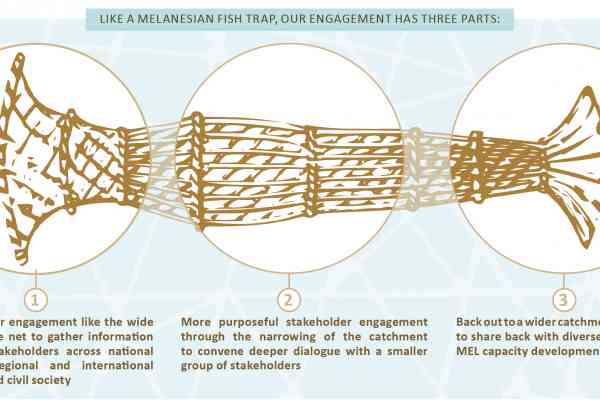A year-long, collaborative commitment to Pacific-led evidence generation and analysis has culminated in the newly launched Pacific Monitoring, Evaluation and Learning (MEL) Capacity Strengthening Rebbilib report.
The Rebbilib report is the product of a region wide talanoa, applying Pacific approaches to consultations, evidence gathering, sense making and validation with MEL practitioners. Consultations included national government civil servants, non-governmental agencies, civil society organisations and regional education and development institutions. In keeping with our commitment to applying a Pacific approach, collaborators agreed to use the traditional Marshall Islands navigational stick map or Rebbilib as the basis for guiding this roadmap document.
The report includes data from MEL capacity assessments undertaken before, during and after the inaugural Pacific MEL convening held in August 2019. Analysis demonstrates the diversity in current MEL capacity at the individual, organisational and country levels across the Pacific.
MEL capacity was assessed against three (3) domains of a MEL system; (i) People, partnerships and planning, (ii) Collecting, verifying and analysing data and (iii) Using data for decision making. Assessments demonstrated diversity in capacity maturity within and across all domains of the MEL system. Importantly however, is that respondents identified most frequently as “progressing”- demonstrating the existing strengths and MEL capacity in the region.
The findings correlate with the resounding request from participants to build on what is already happening in MEL across the Pacific. Recommendations for the voyage ahead are guided by the principles of Pacific-led, contextually relevant and culturally responsive practice, strengths based, iterative capacity strengthening initiatives that meet diverse needs.
The launch is being held virtually with physical venues being hosted in Fiji, New Caledonia and Vanuatu within Covid-19 restrictions.
Esteemed speakers include: His Excellency Tregar Albon Ishoda, Republic of the Marshall Islands Ambassador to Fiji will speak to the metaphor of the Rebbilib and the importance of Pacific ownership that comes from Pacific approaches; Professor Konai Helu- Thaman from the University of the South Pacific and pioneer of the Kakala research Framework will speak to the application of the framework in the development space; Mr Mesake Mataitoga will speak to the application of Pacific approaches in his work with the National Disaster Management Office with the Government of Fiji; and His Excellency Mr Jonathan Curr, New Zealand High Commissioner to Fiji will speak to partnerships in shared principles and implementing the findings of the Rebbilib.
The event is being hosted by the Pacific Community (SPC) and include reflections from Dr Audrey Aumua Deputy Director-General Suva and Dr Stuart Minchin Director-General.
Detailed information on the analysis, methodology and recommendations can be found in the full report available on this link. Video interviews with contributors to this report at the national, regional academic and civil society organisations are available on our Pacific Community (SPC) Youtube page.
More information about the report can be sought by emailing [email protected]
